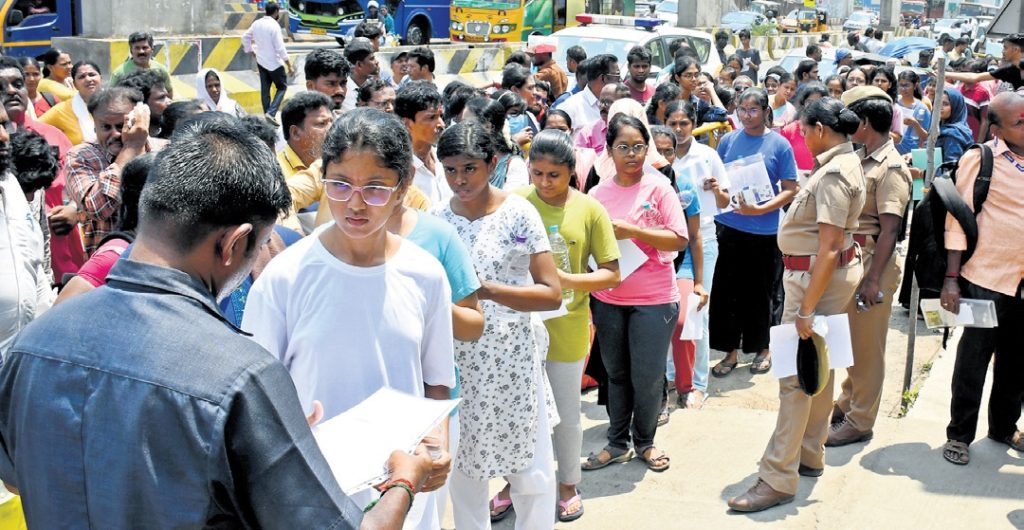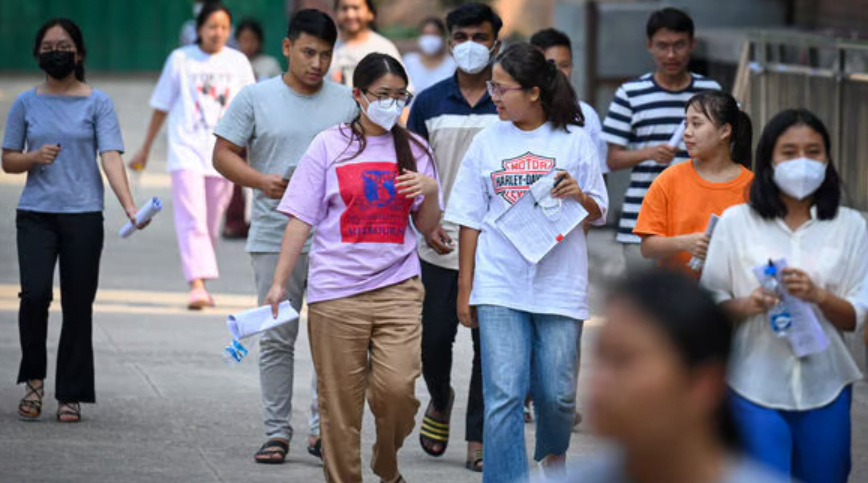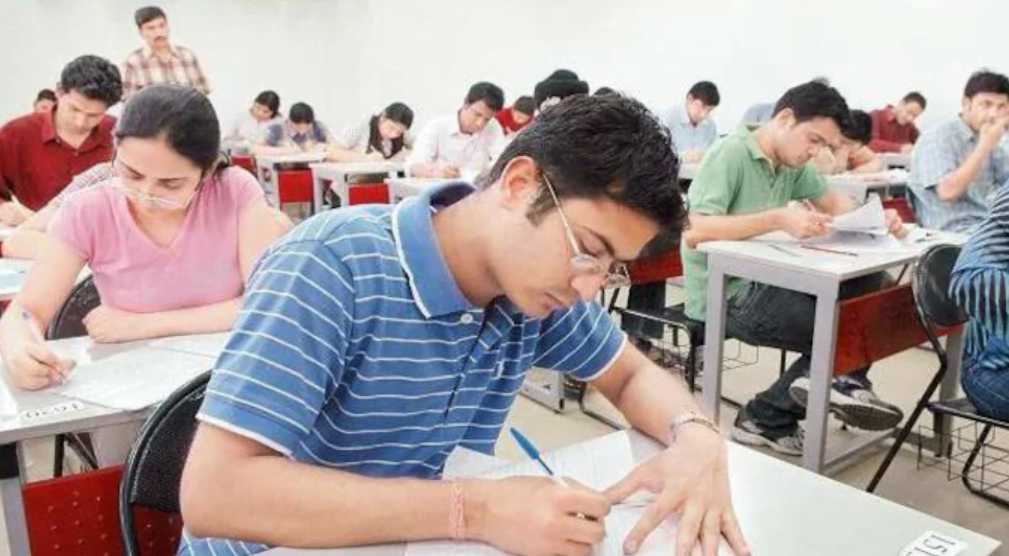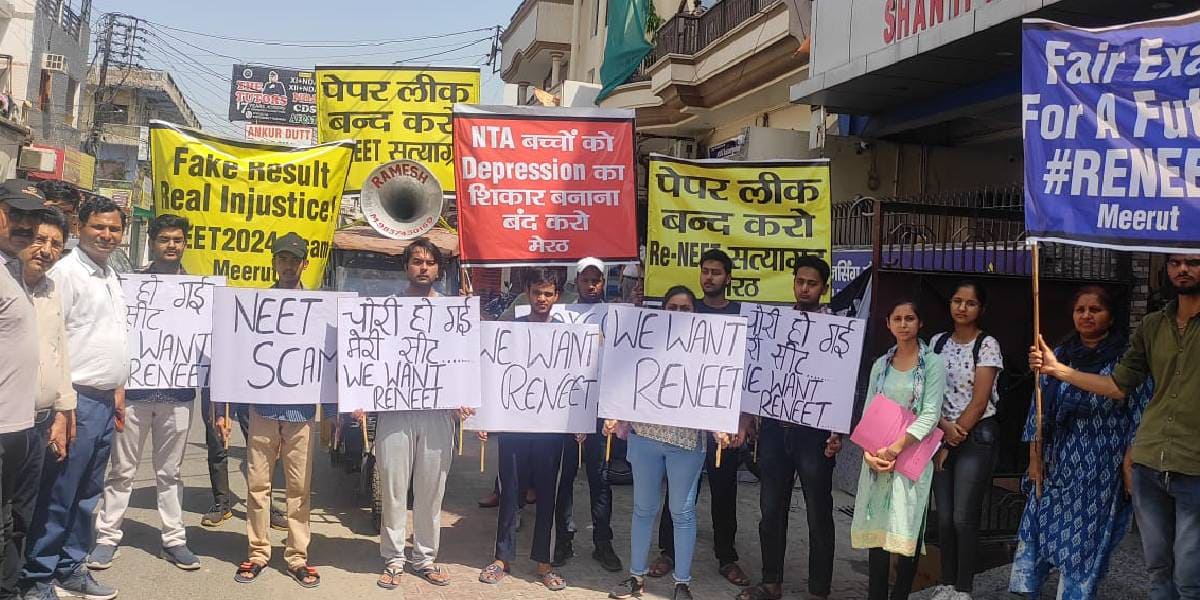NEET 2024’s integrity is under fire amid allegations of irregularities and paper leaks, fueling concerns among students and stakeholders about fairness in medical admissions. The National Testing Agency faces scrutiny as demands for transparency and investigation mount.
4th June was a crucial day for the nation’s aspirants – some eyeing the Lok Sabha seats while more than 23 lakh were waiting to occupy seats in medical colleges. The same day the election results were out, the score and merit list for NEET 2024 were also released.
Despite alleged dereliction of duty by the Election Commission of India, vote suppression and illegal voting cases the results of the LS elections were accepted without much ado. The same cannot be said about NEET 2024. The results have set off one of the most confounding controversies in the recent history of the Indian education system.
Top scorers, mark inflation and claims of malpractice
Over 24 lakh candidates took the exam on May 5, 2024, across 4,750 centres in 571 cities, including 14 international locations. The NEET UG 2024 results were declared on June 4, 2024, by the National Testing Agency (NTA). For good measure here is a memory refresher, the medical entrance examinations were consolidated into a single national entrance examination – NEET in 2013. CBSE examined the first few years before NTA took over in 2018. Full marks in NEET, that is 720, is no mean feat to achieve in this highly competitive exam.

In the past few years, a couple of students would be top scorers with full marks. In 2020 one student, in 2021 two and in 2023 three students had secured 720. In 2024 a few more students seem to have touched the perfect score- 67 to be precise. To add to this merit mystery – multiple rank 1 positions came from the same exam centres, including a case of 6 students scoring 720 from the same centre. The probability of that happening is considerably low. This unprecedented and surprising number of top scorers in turn has caused massive mark inflation.
A student with a 600 score-card would generally be able to get through a government institution but this year scoring 660 might not be enough to guarantee a government seat.
To further ignite suspicion NEET 2024 results saw impossible scores of 718 and 719. The marking scheme grants plus four for each correct answer, minus one for each wrong answer and zero if a question is unattempted. By that logic, the second-highest achievable score in NEET is 716. The NTA attributed some of the high scores and the impossible scores to compensatory marks awarded to candidates who experienced time loss during the exam, experienced significant time loss due to issues such as inaccurate question paper distribution, damaged OMR sheets, and administrative delays at various centres.
Approximately 1,600 candidates were affected, prompting them to file petitions in High Courts for compensation – resulting in the compensatory measures. A writ petition by Physcswallah’s Alakh Pandey alleges NTA of arbitrary grace marking, which includes claims of 70 to 80 marks awarded as compensation. Additionally, NCERT book revisions also led NTA to grant grace marks. The Ministry of Education has formed a four-member panel to investigate and review the compensatory marks awarded to candidates.
The demands for cancellation of the results and re-NEET entail a huge cost. They not only pose a logistical chokehold as the centralised examination is mounted at a spectacular scale but they also shall serve a blow to many deserving students who went through the laborious preparation and examination to qualify.
To add insult to injury, weeks before the release of results there was a petition against alleged NEET paper leak. NTA has denied all allegations regarding the leak despite the ongoing trial in Bihar. Instead, they have claimed that the reason for the mark inflation is compensatory marking based on the normalisation formula and easier physics and chemistry sections.
“Out of the 67 candidates who got 720/720 marks, 44 are on account of the revision in one answer key of Physics and six are on account of compensatory marks for loss of time,” the NTA clarified. The public furore has brought all scattered allegations and concerns to the surface. Students across the country are voicing protests, demanding an independent and transparent investigation of these irregularities.
Consideration of re-NEET, logistical chokehold, unfair blow to students
This year the number of NEET aspirants was considerably higher than last year. In 2023, out of 20,36,316 students, who appeared for the test, 11,45,976 qualified. In 2024, out of 23,33,297 appeared candidates 13,16,268 qualified. The demands for cancellation of the results and re-NEET entail a huge cost. They not only pose a logistical chokehold as the centralised examination is mounted at a spectacular scale but they also shall serve a blow to many deserving students who went through the laborious preparation and examination to qualify.

The court is juggling multiple petitions at the moment. In the latest hearing the Supreme Court, noting the potential impact on the exam’s sanctity, requested a response from the NTA by July 8. However, it declined to halt the counselling process.
A controversy immediately after one of the most crucial and tense elections can only mean one thing – political mulch. Political parties are leveraging the NEET UG 2024 controversy to gain political traction fresh after the Lok Sabha election. Congress leaders Rahul Gandhi and Priyanka Gandhi Vadra are vocally criticising Prime Minister-designate Narendra Modi, highlighting alleged irregularities. Rahul Gandhi assured students he would represent their concerns in Parliament, while Priyanka Gandhi emphasised the need for an investigation into the results and addressed reports of student suicides post-results. Party president Mallikarjun Kharge has demanded a Supreme Court-monitored probe into the irregularities, and Jairam Ramesh has also drawn attention to the issue.
Maharashtra Medical Education Minister Hasan Mushrif alleged financial misconduct in conducting the exams, suggesting that no student from Maharashtra will secure an MBBS seat under the current results. Tamil Nadu Chief Minister M K Stalin reiterated his opposition to the NEET exam, citing the centralisation of the exam process as detrimental to social justice and federalism.
In Kerala, Congress leader V D Satheesan demanded a comprehensive investigation into the results, emphasising the alarming number of perfect scores from a single exam centre. These responses indicate that political parties are using the controversy to criticise the ruling government, mobilise public support, and advocate for educational reforms.
This controversy further weakens the public’s trust in the Indian education system. A few months back West Bengal made headlines for the controversy concerning the 2016 recruitment process for government-sponsored and aided schools, which the Calcutta High Court recently declared “null and void.” This decision affected 25,753 teachers and non-teaching staff appointed through a state-level selection test (SLST). The process involved selecting candidates based on teacher eligibility test (TET) scores, academic marks, interviews, and personality tests.
The controversy erupted when discrepancies were found in the appointment process, including allegations of candidates receiving appointments outside of the SLST merit list and manipulation of OMR answer scripts. The High Court, dissatisfied with the state’s response and cooperation, has ordered a CBI probe into the irregularities and directed candidates to return salaries received with interest.
In 2023, a controversy erupted surrounding the AIIMS nursing recruitment test due to allegations of cheating and manipulation during the Nursing Officer Recruitment Common Entrance Test (NORCET) conducted on June 3. The Central Bureau of Investigation (CBI) had identified Navneet as the alleged mastermind behind the scam, resulting in the arrest of four individuals across Haryana, Chandigarh, Mohali, and Delhi. The scam allegedly involved candidates and the Gian Jyoti Institute of Management & Technology in Mohali.
AIIMS had lodged a complaint leading to cases being filed under IPC sections and the IT Act. AIIMS itself had initiated an internal investigation led by Dr Naval Vikram to probe the allegations further and collaborated with the CBI on their findings.
Anxiety among students, NTA’s failure and what the future holds
The NEET 2024 controversy affects students who have scored well and those who have not in several ways. For students who have performed well, the controversy introduces uncertainty about the validity of their results and the fairness of the competition.

On the other hand, students who have not scored well may feel disillusioned by the controversy, questioning whether their lower scores were a result of genuine performance or external factors beyond their control. Overall, the controversy surrounding NEET 2024 creates a climate of mistrust and anxiety among all students, regardless of their performance.
The NTA should have implemented stringent measures to prevent NEET 2024 controversies like paper leaks and irregularities. They needed secure question paper distribution and robust exam centre monitoring. Now, NTA must conduct a transparent investigation into alleged irregularities, ensuring fairness and credibility. They should communicate openly about their actions to restore student confidence, review exam protocols, and strengthen security measures. NTA’s priority should be maintaining transparency and fairness to uphold NEET’s credibility and ensure all students have an equal opportunity based on merit.
With the Supreme Court’s notice, the NTA faces a deadline to respond. Investigations into irregularities, including the clustering of top scores and discrepancies in marking, are gaining momentum. This scrutiny may lead to a Supreme Court-monitored probe, as demanded by various stakeholders. Public outcry, fueled by reports of student suicides and dissatisfaction with exam results, intensifies pressure for swift and transparent action. Legal and administrative actions, such as adjustments to results or even re-examinations, could follow pending investigation outcomes.
The controversy also prompts broader discussions on educational reforms and the governance of national entrance exams, reflecting concerns about the credibility of future exams and public trust in educational institutions. As the NTA prepares its response and stakeholders await further legal proceedings, the resolution of this controversy will have significant implications for the education system and the students affected.
About the author(s)
She/they is an editor and illustrator from the suburbs of Bengal. A student of literature and cinema, Sohini primarily looks at the world through the political lens of gender. They uprooted herself from their hometown to work for a livelihood, but has always returned to her roots for their most honest and intimate expressions. She finds it difficult to locate themself in the heteronormative matrix and self-admittedly continues to hang in limbo




